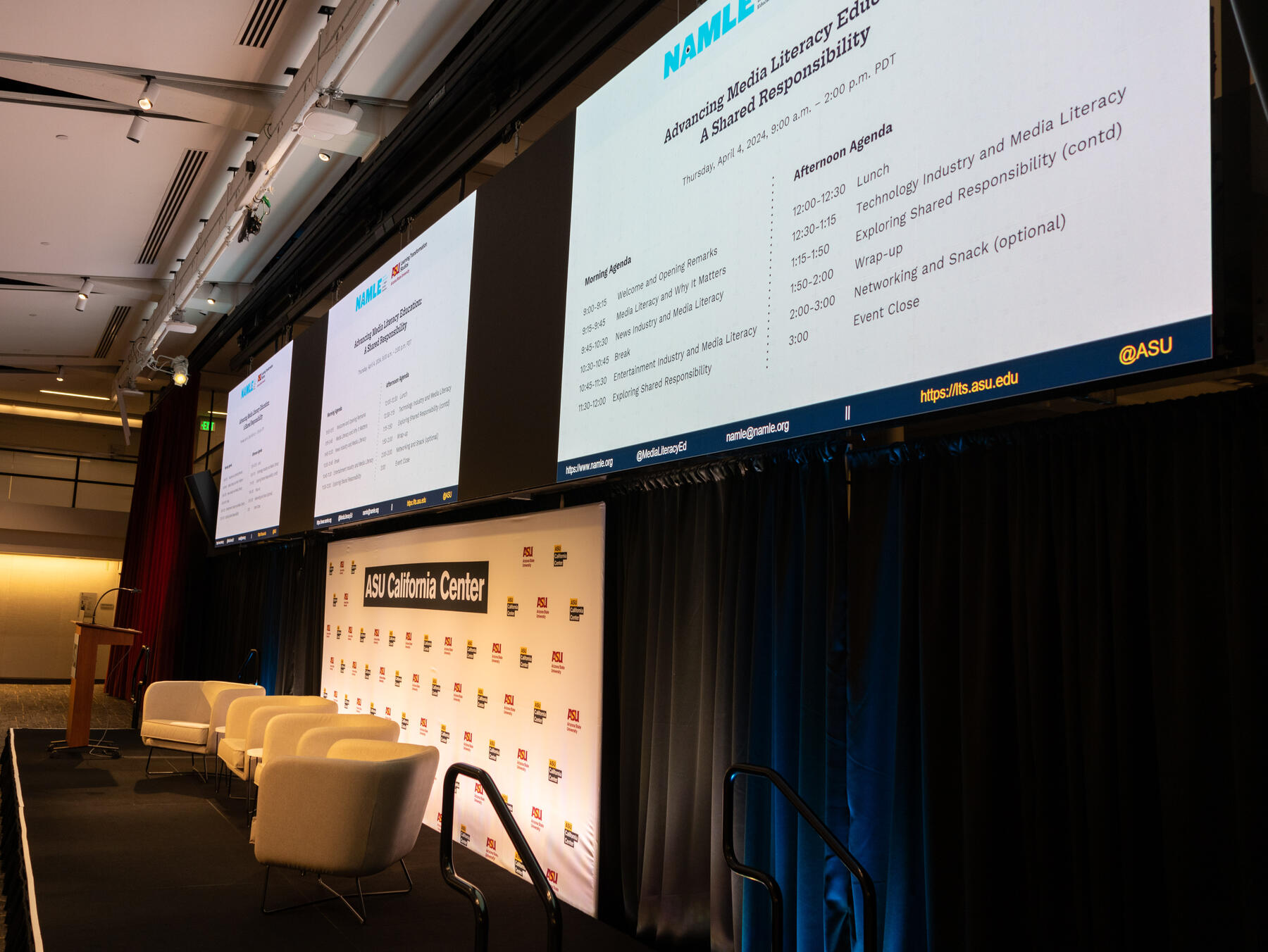
NAMLE and the ASU Learning Transformation Studios Partner to Host Media Literacy Summit at the ASU California Center Broadway
"I truly believe that the future depends on how we understand and navigate the mediated technology-saturated world. But while there is serious momentum in the media literacy movement, we haven't been able to see the shifts we want to ensure that media literacy is essential for all."
With those insightful words, Michelle Ciulla Lipkin, Executive Director of the National Association for Media Literacy Education (NAMLE), opened the April 4, 2024, "Advancing Media Literacy Education: A Shared Responsibility" Summit at the ASU California Center Broadway in Los Angeles.
Co-hosted by NAMLE and the ASU Learning Transformation Studios, the event brought together education, policy, media, tech, and journalism professionals from across the country to address the critical need for media literacy education in today's digital age and discuss how different industries can collaborate on implementing actionable and sustainable solutions.
"We are here today because we know that we are facing an unprecedented time in the world," explained Ciulla Lipkin. "In an era inundated with an overwhelming barrage of information, media literacy education has never been more critical."
During his opening remarks, Alan Arkatov, Executive Director of the ASU Learning Transformation Studios and Senior Advisor to ASU President Dr. Michael Crow, encouraged event participants to "take a critical look at the current landscape, take off the gloves, and push back hard on those using language to undermine our democracy."
"We need to be honest with ourselves. In this digital world, disinformation is going to remain part of our reality. A reality being reshaped for the worse because of it," said Arkatov. "So, if we can't stop it at the source, how do we vaccinate the public, so its impact is, at the very least, muted? I know we all feel a sense of urgency and the weight of our responsibility to act and act decisively."
Arkatov explained that the ASU Media Literacy Task Force, which includes members from every ASU school and enterprise unit, has been working on these complex challenges and is eager to share its findings with the media literacy education community.
"We look forward to working through this together and using our collective throw-weight to move the needle in the right direction," he said.
Dr. Battinto L. Batts, Jr., Dean of ASU's Walter Cronkite School of Journalism and Mass Communication, added, "This is job number one for us, advancing media literacy. Because if we do not do this, all of our other work is for naught."
Dean Batts explained that Cronkite is prioritizing media literacy education with initiatives such as the News Co/Lab, run by ASU professor and NAMLE board member Dr. Kristy Roschke and Celeste Sepessy, an assistant teaching professor at Cronkite and the program manager at the News Co/Lab. The school also offers the nation's first bachelor's degree in digital media literacy and has expanded media literacy courses and learning opportunities for ASU students and the broader community.
"Universities play a vital role in getting students the 21st-century literacy skills they need to meet the challenges of an increasingly mediated and complex digital world," said Dean Batts.
"Journalism schools, in particular, must rise to the challenge of preparing informed ethical storytellers, content creators, and strategic communicators. This is why the Cronkite School has made media literacy education and combatting misinformation top strategic priorities," he added.
Foreshadowing the Summit's primary theme, Dean Batts explained that universities and other educational institutions can't be solely responsible for building people's media literacy skills. While the Dean believes we are making progress, he said journalism and media organizations, entertainment and tech companies, nonprofits, and government agencies must work together to create a more media-literate world.
Following the opening remarks, the Summit attendees heard from a diverse array of speakers and panelists in the media, entertainment, and technology industries, including representatives from the Centre for Information Resilience (a nonprofit dedicated to countering disinformation), Reuters News Agency, LAist, Media Done Responsibly (a media consulting firm focused on ethical practices), Participant, NAACP, Meta, Roblox, and YouTube.
The panels focused on the intersections between media literacy and these various industries and how different groups can collaborate to build momentum for the media literacy movement.
"Being a critical thinker and an active participant in democracy hinges on media literacy. These problems arise fast, and we cannot solve them alone. We hope that by the end of the day, you will see that you have a role to play and will be inspired to join us in this movement," explained Ciulla Lipkin.
During the discussions with the attendees, many of the Summit participants expressed a renewed commitment to advancing media literacy education and working with groups from other sectors. While the group expressed concern about the current media literacy landscape and the rise of misinformation and disinformation, they also expressed optimism about having the tools and relationships necessary to move the needle and make significant progress in the years to come.
Throughout the event, many of the attendees said that as the digital landscape continues to evolve, a multifaceted approach involving educators, media professionals, technology companies, and policymakers will be essential to equipping individuals with the skills necessary to navigate the complexities of the modern media environment.
NAMLE plans to continue this critical conversation during its annual virtual conference on July 12 and 13, 2024, while the ASU Learning Transformation Studios will be releasing the findings of its Media Literacy Task Force at the end of the academic year. These ongoing efforts underscore the commitment of key stakeholders to advancing media literacy education as a vital component of an informed and engaged citizenry.